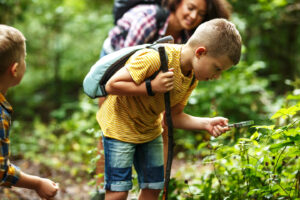During this well-deserved break from school, it’s common for kids, especially those with learning
differences like dyslexia or ADHD, to experience challenges maintaining their academic skills.
Yet, within this challenge lies a beautiful opportunity—to weave learning into summer fabric
through exploring nature.
Nature caters to children’s innate curiosity and needs for sensory engagement, providing a
backdrop for experiences that are as educational as they are therapeutic. Here are some tips on
preventing the summer slide through the lens of nature exploration.
1. Plan a Nature Scavenger Hunt
This is a versatile outdoor activity in which children search for specific items or phenomena in
nature, such as leaves, rocks, insects, or sounds. It encourages observation, fosters a
connection with the environment, and prompts questions.
For example, a simple list for a scavenger hunt might include:
• A leaf with smooth edges
• A rock with a fossil
• The sound of two different birds
• Something red in nature
2. Take a Local Field Trip to a State Park or Other Outdoor
Settings
Outdoor trips provide a dynamic backdrop for hands-on exploration and discovery, encouraging
children to connect with nature. Visits to state parks or similar outdoor settings allow children to
engage with diverse ecosystems, witness wildlife in their natural habitats, and learn about the
area’s geography and history. These experiences are best for children who thrive on tactile and
visual stimulation.
3. Start a Gardening Project
Gardening immerses your child in a sensory-rich learning environment and is a practical tool for
reinforcing scientific concepts and cultivating life skills. Beginning with easy-to-grow plants like
sunflowers, radishes, and cherry tomatoes offers immediate engagement and quick results,
critical for maintaining the interest of children with learning differences.
Gardening tasks include the following learning benefits:
• Enhances Focus: Regular care for plants demands attention to detail, improving
concentration.
• Encourages Scientific Thinking: Direct involvement with plant growth fosters a deeper
understanding of biology and ecology.
• Builds Responsibility and Patience: The ongoing commitment to a garden teaches
the value of diligence and waiting for results.
4. Prepare Nature Photography Projects
Nature photography projects invite children to explore the outdoors through a camera lens,
turning a simple walk into an adventure of discovery and expression.
By setting specific themes for photography outings, such as the diversity of plant life or the
intricacies of insect wings, children are encouraged to observe their environment closely,
enhancing their attention to detail and nurturing their creative expression. Besides,
implementing this project is straightforward: a basic camera or smartphone is all needed to start.
5. Engage in Nature Art and Journaling
Engaging in nature art and journaling can be a beneficial experience for children, blending the
tranquility of nature with the reflective practice of journaling and the creativity of art. This activity
offers a serene outlet for expression and supports learning in an integrated, meaningful way.
• Nature Art: Invite your child to create art using natural materials they find during outdoor
explorations. This could include leaf rubbings, twig sculptures, or assembling collages
from various natural items like petals and leaves.
• Nature Journaling: Give your child a journal to record their observations, thoughts, and
feelings about the natural world. They can draw what they see, write about their
experiences in nature, or even compose poems inspired by their surroundings.
6. Explore Specialized Summer Programs
Enrolling your child in a specialized summer program can give them the structure and support
they need to continue their academic progress and address specific learning challenges. These
programs, tailored to individual needs and learning styles, ensure that summer becomes a time
of growth and discovery.
• FLEX Summer Program: This program is ideal for students seeking to strengthen their
skills in math, writing, reading comprehension, and fluency. Through a comprehensive
assessment process, including subject area screenings and full evaluations, each
student is matched with a program that aligns perfectly with their academic goals,
ensuring learning continues without interruption.
• SMART Summer Program: This program offers intensive support in key academic
areas for students facing specific learning challenges. Targeting students at risk for or
diagnosed with dyslexia, Specific Learning Disability (SLD), Central Auditory Processing
Disorder (CAPD), or Auditory Processing Disorder (APD), SMART focuses on building
foundational skills in phonemic awareness, phonics, fluency, and critical literacy.
Seizing the Summer with Nature’s Company
Experiences in nature support academic skills and foster a deeper connection with the world
around us. They encourage kids’ curiosity, resilience, and a love for learning that transcends the
classroom. These moments of discovery and achievement are incredibly precious for children
with learning differences. They offer a chance to see their abilities in a new light and to
understand that learning can be a personalized, engaging, and endlessly rewarding journey.
As parents and educators, we guide, support, and provide the resources they need to flourish.
Let’s embrace the summer not as a hiatus from learning but as an invaluable space to grow and
explore. Together, we can ensure that every child enters the new school year not only ready to
learn but eager to embrace the challenges and opportunities that lie ahead.





